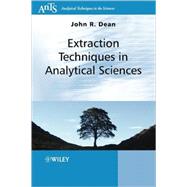
What is included with this book?
Preface.
Acknowledgements.
Acronyms, Abbreviations and Symbols.
About the Author.
1 Pre and Post-Extraction Considerations.
AQUEOUS SAMPLES.
2 Classical Approaches for Aqueous Extraction.
3 Solid Phase Extraction.
4 Solid Phase Microextraction.
5 New Developments in Microextraction.
SOLID SAMPLES.
6 Classical Approaches for Solid-Liquid Extraction.
7 Pressurized Fluid Extraction.
8 Microwave-Assisted Extraction.
9 Matrix Solid Phase Dispersion.
10 Supercritical Fluid Extraction.
GASEOUS SAMPLES.
11 Air Sampling.
COMPARISON OF EXTRACTION METHODS.
12 Comparison of Extraction Methods.
RESOURCES.
13 Resources for Extraction Techniques.
Responses to Self-Assessment Questions.
Glossary of Terms.
SI Units and Physical Constants.
Periodic Table.
General Index.
Application Index.
The New copy of this book will include any supplemental materials advertised. Please check the title of the book to determine if it should include any access cards, study guides, lab manuals, CDs, etc.
The Used, Rental and eBook copies of this book are not guaranteed to include any supplemental materials. Typically, only the book itself is included. This is true even if the title states it includes any access cards, study guides, lab manuals, CDs, etc.